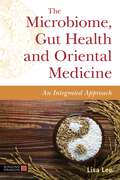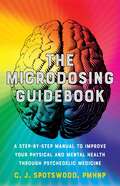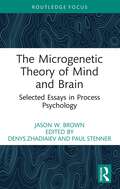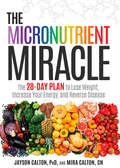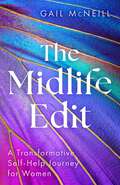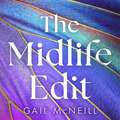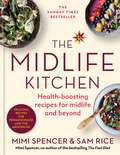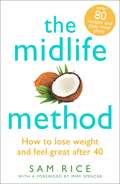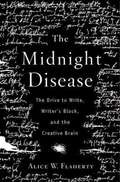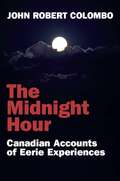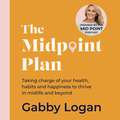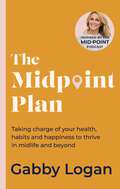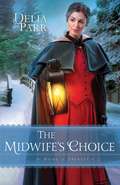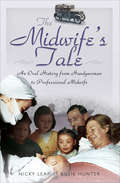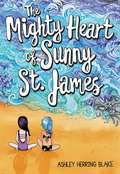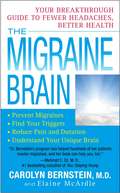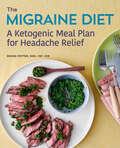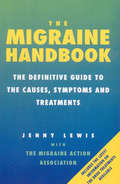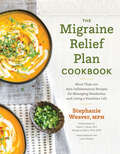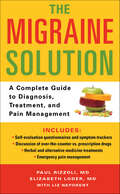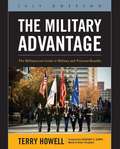- Table View
- List View
The Microbiome, Gut Health and Oriental Medicine: An Integrated Approach
by Lisa LeeThe human microbiome and its resident micro-organisms have in recent years come to represent a new frontier in health research and science. Yet this body of knowledge has hitherto been little addressed within Oriental Medicine theory and has consequently been underutilised in practice. The book proposes a novel and ground-breaking approach to understanding and influencing gut health and the microbiome by integrating the latest evidence from Western medical research and the long-established theory and practice of Oriental medicine. Building on an understanding of the body as a complete ecosystem where symbiotic relationships maintain balance in both mind and body, this integrative model sheds new light on an area that has seen rapidly growing interest both in and out of scientific communities, providing a more holistic and comprehensive perspective that both unites and broadens the potential applications of microbiome knowledge across medical and therapeutic traditions.The book's focus on the microbiome of the gastro-intestinal tract allows to explore the far-reaching and wide-ranging effects of the gut's micro-organisms on other body systems, on their ability to maintain good physical and mental health, and to fight disease and illness. This emphasis further provides readers with a practical guide to understanding and supporting a well-functioning gut and microbiome, through lifestyle choices and practices that focus on eating well, sleep hygiene, and mindful living.The booming interest in the area of gut health makes this compelling, accessible and informative hands-on book, an important tool for patients and practitioners of Oriental medicine and other relevant disciplines, offering readers a unique opportunity to add a new dimension to their knowledge of gut health. It will allow practitioners to deepen their professional development and enhance the quality of the care they provide by honing therapeutic skills and creating hybrid treatment plans that combine the latest findings from the gut-health literature and Oriental medicine.
The Microdosing Guidebook: A Step-by-Step Manual to Improve Your Physical and Mental Health through Psychedelic Medicine
by C.J. SpotswoodLearn about the history, research, and helpful effects of microdosing psychedelic medicines like psilocybin, LSD, ecstasy, and more with this combination manual and workbook.Microdosing, or taking between 1/10th and 1/20th of the normal dose of a psychedelic drug is the latest way to improve performance, stave off chronic pain, and alleviate a variety of other ailments like anxiety and depression. Unlike a psychedelic trip, microdosing does not alter your mental status or interfere with day-to-day life. Part handbook and part workbook, The Microdosing Guidebook is your ultimate reference for safely using psychedelic medicine. Inside you&’ll find: The most up-to-date research on psychedelics A complete history of psychedelics and their medicinal uses How to find the correct dose for your unique body and situation A place to track your experiences and improvements And much more! Whether you have experience with psychedelics or are simply curious to learn more, The Microdosing Guidebook has everything you need to get started on your healing journey.
The Microgenetic Theory of Mind and Brain: Selected Essays in Process Psychology
by Jason W. BrownThis book asks where ideas, objects and feelings come from and how they arise via an exploration of the nature of subjective experience and its relation to the world. Seeking an explanation for the experience of subjective duration and the present and in contrast to the conception of mental events as non-temporal logical solids, it explores a diachronic processual theory founded on psychological data and clinical observation that provides an explanatory “system” of thought adequate to the phenomena it is called on to explain. The author focuses on the intra-psychic sources and nature of subjective experience, with the intent of examining a variety of phenomena from the standpoint of microgenetic theory. The chapters deal with the origins of human subjectivity and the epochal nature of time and duration, change and the relevance of a theory of the mental state to dream and the waking present. Based on speculative psychology that flows from case studies in neuropsychology and concepts in process philosophy, it advances a theory of mind and brain that brings together previous, fragmentary research studies on this topic.
The Micronutrient Miracle: The 28-Day Plan to Lose Weight, Increase Your Energy, and Reverse Disease
by Jayson Calton Mira CaltonOur poor health and growing waistlines can be traced back to the hidden crisis of a micronutrient deficiency. More than 90 percent of all Americans are deficient in at least one of these health-promoting vitamins and minerals and don't even know it. According to nutritionists Jayson and Mira Calton, micronutrients--vitamins and minerals essential for optimum health--are being stripped from our diet and depleted by our lifestyle habits. And these deficiencies cause today's most common illnesses. Mira herself developed advanced osteoporosis at the age of 30. But with Jayson's help, she reversed her disease through micronutrient therapy. The Caltons created The Mircronutrient Miracle, an incredible cure-all program, to help you lose weight and prevent and reverse common disorders, including obesity, heart disease, and diabetes. The Micronutrient Miracle explains the truth about what you're really eating and how your habits may be depleting essential micronutrients. It also provides an easy-to-follow 28-day plan to reverse these effects by restoring your depleted micronutrients. And the best part? This book is tailor-made to work with your lifestyle, including gluten-free, low-carb, low-fat, vegan, and Paleo recipes!
The Middle Place
by Kelly CorriganThe Middle Place is memoir at its highest form. For Kelly Corrigan, family is everything. At thirty-six, she had a marriage that worked, two funny, active kids, and a weekly newspaper column. Then she went to the doctor...
The Midlife Edit: A Transformative Self-Help Journey for Women
by Gail McNeillThe major new book from social media sensation and midlife influencer Gail McNeil, @fiftysister: A transformational edit for your very best life 'If this is midlife, bring it on!' Emma Howarth 'This book opens a door for women in midlife! Mimi Kirk ⭐⭐⭐⭐⭐ 'An inspiring message... Full of helpful self-care and practices to help both the body and mind' 5-star Netgalley ReviewIn 2019, Gail McNeill sold her cherished family home and moved to Portugal with just a few boxes of possessions. Soon after, the Covid pandemic enforced her isolation in a remote part of the world and sparked a cascade of introspection that led her to question every facet of her life, struggling to reconcile past choices with present reality. She started a journey of complete reinvention, from which she emerged physically, emotionally and spiritually transformed.Now better known to her hundreds of thousands of followers as @fiftysister, Gail shares her story of midlife metamorphosis to guide you step by step along your own path to reinvention. Showing that it's never too late to transform your life, The Midlife Edit will show you how to build a cocoon nourished by dietary, lifestyle and spiritual insights from which you can emerge transformed and re-energized, to make the absolute most of your middle years.Gail shows you how, by prioritizing self-care for just one year, you can unlock the secrets of health span, building strength and confidence for life, nourishing your body and your mind, and allowing you to enter this unique new phase of your life not diminished, but empowered.Let The Midlife Edit inspire you to invest in yourself, to imagine the life you truly desire - and to be seen, as you never have been before.
The Midlife Edit: A Transformative Self-Help Journey for Women
by Gail McNeillThe midlife years are only the beginning - a transformational edit for your very best life.In 2019, Gail McNeill sold her cherished family home and moved to Portugal with just a few boxes of possessions. Soon after, the Covid pandemic enforced her isolation in a remote part of the world and sparked a cascade of introspection that led her to question every facet of her life, struggling to reconcile past choices with present reality. She started a journey of complete reinvention, from which she emerged physically, emotionally and spiritually transformed.Now better known to her hundreds of thousands of followers as @fiftysister, Gail shares her story of midlife metamorphosis to guide you step by step along your own path to reinvention. Showing that it's never too late to transform your life, The Midlife Edit will show you how to build a cocoon nourished by dietary, lifestyle and spiritual insights from which you can emerge transformed and re-energized, to make the absolute most of your middle years.Gail shows you how, by prioritizing self-care for just one year, you can unlock the secrets of health span, building strength and confidence for life, nourishing your body and your mind, and allowing you to enter this unique new phase of your life not diminished, but empowered.Let The Midlife Edit inspire you to invest in yourself, to imagine the life you truly desire - and to be seen, as you never have been before.
The Midlife Edit: A Transformative Self-Help Journey for Women
by Gail McNeillThe major new book from social media sensation and midlife influencer Gail McNeil, @fiftysister: A transformational edit for your very best life 'If this is midlife, bring it on!' Emma Howarth 'This book opens a door for women in midlife! Mimi Kirk ⭐⭐⭐⭐⭐ 'An inspiring message... Full of helpful self-care and practices to help both the body and mind' 5-star Netgalley ReviewIn 2019, Gail McNeill sold her cherished family home and moved to Portugal with just a few boxes of possessions. Soon after, the Covid pandemic enforced her isolation in a remote part of the world and sparked a cascade of introspection that led her to question every facet of her life, struggling to reconcile past choices with present reality. She started a journey of complete reinvention, from which she emerged physically, emotionally and spiritually transformed.Now better known to her hundreds of thousands of followers as @fiftysister, Gail shares her story of midlife metamorphosis to guide you step by step along your own path to reinvention. Showing that it's never too late to transform your life, The Midlife Edit will show you how to build a cocoon nourished by dietary, lifestyle and spiritual insights from which you can emerge transformed and re-energized, to make the absolute most of your middle years.Gail shows you how, by prioritizing self-care for just one year, you can unlock the secrets of health span, building strength and confidence for life, nourishing your body and your mind, and allowing you to enter this unique new phase of your life not diminished, but empowered.Let The Midlife Edit inspire you to invest in yourself, to imagine the life you truly desire - and to be seen, as you never have been before.
The Midlife Kitchen: Health-boosting Recipes For Midlife And Beyond
by Mimi Spencer Sam RiceAre you at a point in your life where health is becoming more of a priority? Are you confused by ever-changing headlines that contrive to make the simple act of eating a peril rather than a pleasure? The Midlife Kitchen has the answers.Midlife is not a time to be concerned with food fads and foibles, but rather a glorious opportunity to wrest back control of your eating in the interests of health, happiness and a long life. Taste must certainly come first, but with health firmly snapping at its heels, underpinned by well-established nutritional common sense. Busy lives require simple, sustaining recipes that incorporate health-giving ingredients without too much fanfare or fuss. This book is not about 'clean-eating' or super foods, detoxing or restriction. Instead, it is about building up a balanced and diverse diet, with less sugar, better fat and good carbs. Alongside each recipe is the Midlife Kitchen emblem, the star anise. With each of the eight seeds representing a specific Midlife Health category - such as Hormone Harmony; Mind, Memory, Mood; or Heart Health - authors Sam and Mimi are able to provide simple nutritional information. Health tips explain the benefits of certain ingredients, while 'Why We Love It' sections explore the advantages of cooking each dish. Midlife Must-Haves show how to create homemade essentials such as Midlife Grown-up Granola, Midlife Power Porridge and Midlife Sweetener. From Seared Sirloin on Pan-roasted Veg to The Mother of All Greek Salads, Nurture Bircher to Three-ginger Fire Cake, the recipes in this book come together to create a vibrant menu bursting with mouth-watering flavours.
The Midlife Kitchen: health-boosting recipes for midlife & beyond
by Mimi Spencer Sam RiceAs featured in The Times and The Daily Mail.Are you at a point in your life where health is becoming more of a priority? Are you confused by ever-changing headlines that contrive to make the simple act of eating a peril rather than a pleasure? The Midlife Kitchen has the answers.Midlife is not a time to be concerned with food fads and foibles, but rather a glorious opportunity to wrest back control of your eating in the interests of health, happiness and a long life. Taste must certainly come first, but with health firmly snapping at its heels, underpinned by well-established nutritional common sense. Busy lives require simple, sustaining recipes that incorporate health-giving ingredients without too much fanfare or fuss. This book is not about 'clean-eating' or super foods, detoxing or restriction. Instead, it is about building up a balanced and diverse diet, with less sugar, better fat and good carbs. Alongside each recipe is the Midlife Kitchen emblem, the star anise. With each of the eight seeds representing a specific Midlife Health category - such as Hormone Harmony; Mind, Memory, Mood; or Heart Health - authors Sam and Mimi are able to provide simple nutritional information. Health tips explain the benefits of certain ingredients, while 'Why We Love It' sections explore the advantages of cooking each dish. Midlife Must-Haves show how to create homemade essentials such as Midlife Grown-up Granola, Midlife Power Porridge and Midlife Sweetener. From Seared Sirloin on Pan-roasted Veg to The Mother of All Greek Salads, Nurture Bircher to Three-ginger Fire Cake, the recipes in this book come together to create a vibrant menu bursting with mouth-watering flavours.
The Midlife Method: How to lose weight and feel great after 40
by Sam RiceIn The Midlife Method, food and lifestyle writer Sam Rice explores why it is so much harder to lose weight as we get older and what we can do about it.Rather than focusing exclusively on restricted eating, as so many diets do, Sam guides us through her 'method' for midlife weight loss based on extensive research into the specific physiological changes that occur in our middle years. She answers the questions that she herself asked when, in her forties, the weight suddenly started accumulating around the middle: * Why is this happening to me? * What am I eating that isn't helping?* What foods should I be eating more of? * How do calories fit into the equation? * How much and what kinds of exercise are most beneficial? * What other lifestyle changes do I need to make? Including more than 80 delicious recipes for breakfast, lunch and family-friendly dinners, along with an easy 4-week meal plan, The Midlife Method shows how combining Light Days (active calorie restriction via calorie-controlled recipes) and Regular Days (focused on eating well-balanced, nutrient-dense food) can bring about healthy and sustainable weight loss. But we don't just want to lose weight as we get older, we want to feel great too, that is where The Midlife Method Healthy Habits come in. Learn how to exercise optimally, get a better night's sleep, manage stress and enjoy alcohol as part of a healthier lifestyle. If you feel stuck in a midlife weight rut then this is the book for you.
The Midlife Method: How to lose weight and feel great after 40
by Sam RiceIn The Midlife Method, food and lifestyle writer Sam Rice explores why it is so much harder to lose weight as we get older and what we can do about it.Rather than focusing exclusively on restricted eating, as so many diets do, Sam guides us through her 'method' for midlife weight loss based on extensive research into the specific physiological changes that occur in our middle years. She answers the questions that she herself asked when, in her forties, the weight suddenly started accumulating around the middle: * Why is this happening to me? * What am I eating that isn't helping?* What foods should I be eating more of? * How do calories fit into the equation? * How much and what kinds of exercise are most beneficial? * What other lifestyle changes do I need to make? Including more than 80 delicious recipes for breakfast, lunch and family-friendly dinners, along with an easy 4-week meal plan, The Midlife Method shows how combining Light Days (active calorie restriction via calorie-controlled recipes) and Regular Days (focused on eating well-balanced, nutrient-dense food) can bring about healthy and sustainable weight loss. But we don't just want to lose weight as we get older, we want to feel great too, that is where The Midlife Method Healthy Habits come in. Learn how to exercise optimally, get a better night's sleep, manage stress and enjoy alcohol as part of a healthier lifestyle. If you feel stuck in a midlife weight rut then this is the book for you.
The Midnight Disease: The Drive to Write, Writer's Block, and the Creative Brain
by Alice Weaver FlahertyNeurologist Flaherty (Massachusetts General Hospital and Harvard Medical School) explains the psychological and neuroscientific knowledge about the process of writing for a lay audience. She discusses the temporal lobe's role in "abnormal hypergraphia," an increased desire to write. She then explores psychological and neurological explanations for writer's block. The roles of the cerebral cortex in writing ability, the limbic system in the drive to communication, and the temporal lob in metaphorical thinking are examined in subsequent chapters. Annotation ©2004 Book News, Inc. , Portland, OR (booknews. com)
The Midnight Hour: Canadian Accounts of Eerie Experiences
by John Robert ColomboThe Midnight Hour is amazing, amusing, and frightening. It will make you pause to wonder - about ghosts and spirits, fate and destiny, strange beasts and even stranger human beings. The accounts within describe encounters in Canada with monsters and mysteries from 1784 to the present. Editor and anthologist John Robert Colombo derived these true tales from nineteenth-century newspapers, personal correspondence, e-mails, interviews, and more. The collection is certain to entertain you … especially during "the midnight hour"!
The Midpoint Plan: Taking charge of your health, habits and happiness to thrive in midlife and beyond
by Gabby LoganIT'S TIME TO REDEFINE MIDDLE AGEMAKE THE MIDPOINT THE START OF THE REST OF YOUR LIFE! Inspired by the hit podcast, The Mid-Point Plan is your midlife survival kit.Packed to the brim with advice and life lessons from experts in their field (Dr Louise Newson, Prof Greg Whyte amongst others) and successful people navigating this time of life (Claudia Winkleman, Jo Whiley, Lee Mack, Michael Johnson, Caitlin Moran, Phil Neville and so many more) the book draws on their wise words to help you to navigate the biggest challenges that midlife can throw at you. It will help you to:- keep yourself fit and healthy into older age- keep your brain firing on all cylinders- improve your sleep- deal with anxiety- thrive in your career- navigate changing relationships (whether that's empty nests or aging parents)- cope with illness and loss- be a healthier, more productive, creative and happy older personWith a Midpoint Action Plan (MAP) at the end of each chapter, it contains all the tips and tricks, habits and practices you need for a positive mindset, a healthy body and a happy life. It's a must-have manual for all mid-life men and women.You can read it all the way through or you can keep it by the bed, on the shelf in the kitchen or in the loo to dip into when you need help with something in particular. However you read it, it will be there to offer comfort, motivation and maybe a shared experience to help you through the tougher days.
The Midpoint Plan: Taking charge of your health, habits and happiness to thrive in midlife and beyond
by Gabby LoganIT'S TIME TO REDEFINE MIDDLE AGEMAKE THE MIDPOINT THE START OF THE REST OF YOUR LIFE! Inspired by the hit podcast, The Mid-Point Plan is your midlife survival kit.Packed to the brim with advice and life lessons from experts in their field (Dr Louise Newson, Prof Greg Whyte amongst others) and successful people navigating this time of life (Claudia Winkleman, Jo Whiley, Lee Mack, Michael Johnson, Caitlin Moran, Phil Neville and so many more) the book draws on their wise words to help you to navigate the biggest challenges that midlife can throw at you. It will help you to:- keep yourself fit and healthy into older age- keep your brain firing on all cylinders- improve your sleep- deal with anxiety- thrive in your career- navigate changing relationships (whether that's empty nests or aging parents)- cope with illness and loss- be a healthier, more productive, creative and happy older personWith a Midpoint Action Plan (MAP) at the end of each chapter, it contains all the tips and tricks, habits and practices you need for a positive mindset, a healthy body and a happy life. It's a must-have manual for all mid-life men and women.You can read it all the way through or you can keep it by the bed, on the shelf in the kitchen or in the loo to dip into when you need help with something in particular. However you read it, it will be there to offer comfort, motivation and maybe a shared experience to help you through the tougher days.
The Midwife's Choice (At Home in Trinity #2)
by Delia Parr[From the back cover:] Come Home to Friendship, Family, and Faith in the Town of Trinity In a time when the traditional ways of medicine are constantly being questioned by new doctors fresh from medical school, midwife Martha Cade tries to balance her life’s calling with the demands of her family. Recently reunited with her estranged seventeen-year-old daughter, Martha finds herself torn between guiding her child and allowing her to be an adult. At the same time, she must decide whether she’ll risk reopening the heart she’d long closed off to love. Though a small town, Trinity; Pennsylvania, is fraught with secrets, and as a midwife, Martha moves among its people. She knows which homes are filled with light and love, which families have slipped into grief, which wives are unhappy, and which husbands dare to cross lines.... As Martha struggles with the conflicts of being a mother, a midwife, and a woman, she learns the greatest lessons of all--that hope can shine even in the darkest hours, and that faith has a way of making the impossible possible.
The Midwife's Tale: An Oral History from Handywoman to Professional Midwife
by Billie Hunter Nicky LeapMothers and midwives reveal the wonders and difficulties of early twentieth century childbirth in this informative and insightful healthcare history. Before the foundation of the United Kingdom&’s National Health Service (NHS) in 1948, expectant mothers relied on midwives to help them through childbirth. Based on interviews conducted with dozens and mothers and retired midwives over several years, Billie Hunter and Nicky Leap&’s The Midwife&’s Tale shares the stories of these women in their own words, shedding light on their experiences and on the realities of childbirth in the first half of the twentieth century. Intriguing, poignant, and sometimes humorous, this oral history covers the experiences of women from the 1910s through the 1950s including accounts of the difficulties of rearing large families in poverty-stricken environments and the lack of information about contraception and abortion—even as midwifery changed from an unqualified &“handywoman&” skill to an actual profession.
The Mighty Heart of Sunny St. James
by Ashley Herring BlakeTwelve-year-old Sunny St. James navigates heart surgery, reconnecting with her lost mother, first kisses, and emerging feelings for another girl in this stunning, heartfelt novel--perfect for fans of Ali Benjamin and Erin Entrada Kelly. <P><P>When Sunny St. James receives a new heart, she decides to set off on a "New Life Plan": 1) do awesome amazing things she could never do before; 2) find a new best friend; and 3) kiss a boy for the first time. <P><P>Her "New Life Plan" seems to be racing forward, but when she meets her new best friend Quinn, Sunny questions whether she really wants to kiss a boy at all. With the reemergence of her mother, Sunny begins a journey to becoming the new Sunny St. James. <P><P>This sweet, tender novel dares readers to find the might in their own hearts.
The Migraine Brain: Your Breakthrough Guide to Fewer Headaches, Better Health
by Carolyn Bernstein Elaine McardleYou know that your migraine isn't just a headache. But you may not know that migraine actually is a neurological disease. Affecting one in five women, one in twenty men, and one in twenty children, it's a debilitating, complex, and chronic condition that manifests in a combination of symptoms that can include excruciating head pain as well as other distinctive physical and emotional effects. Yet it's also a disease that you can get control of, improve, and manage, as Dr. Carolyn Bernstein has discovered in her seventeen years as a Harvard Medical School faculty member and practicing neurologist. Praised for her excellence and compassion, the founder of the Women's Headache Center near Boston, and a migraine sufferer herself, Dr. Bernstein has helped hundreds of her patients get better. Now, with The Migraine Brain, the most comprehensive, up-to-the-minute book on migraines ever written, you will be able to do the same -- reduce the frequency and intensity of your migraines, learn how to prevent and curtail them and how to recover from them more quickly, and mitigate migraine's effects on every aspect of your life: in the workplace and at home and during sex and travel. Every migraine is different because everyone who gets a migraine has a distinctive "Migraine Brain" with its own sensitivities and triggers. That's why it's so important for you to develop a personalized wellness plan to radically reduce the number and severity of your migraines. Dr. Bernstein also explains why migraines happen, why they are so often misdiagnosed, and why so few people get the right treatment for them. She reveals the latest research that shows that Migraine Brains share a hypersensitivity to stimuli -- the Migraine Brain can actually look different from others on a brain scan -- and is more likely to experience a cascade of neurological reactions that give rise to the common clusters of migraine symptoms. This breakthrough medical knowledge makes treatment and recovery possible with new migraine-specific drugs as well as with complementary treatments such as yoga, biofeedback, and an exercise regimen. With the extraordinarily thorough recommendations of The Migraine Brain in your hands, you will be fully equipped with all the latest information you need to understand migraines and to help your family and co-workers understand that migraine isn't just a headache: it's a serious, yet treatable disease.
The Migraine Diet: A Ketogenic Meal Plan for Headache Relief
by Denise Potter RDN, CSP, CDEKeep migraines at bay—the keto way Discover a diet-based approach to treating chronic migraines. The Migraine Diet adapts the ketogenic diet (eating high fat and low carb foods to alter the way your body burns fuel) into a practical meal plan and cookbook that targets the causes of migraines. Relief is possible—and it tastes great. See for yourself how eating keto can help lessen the frequency and intensity of migraines. The Migraine Diet includes basic nutrition guidelines, delicious recipes, and a detailed 4-week schedule for when to eat them. You'll also find space to write down the changes you observe in your body, and guided questions to help you identify patterns and potential triggers so you can stay on the path to healing. The Migraine Diet will teach you how to: Refresh and restock—Learn how to clear out and rebuild your kitchen staples so you have everything you need, and nothing you don't. Find the fun—This encouraging plan can help you live with less migraine pain—and even introduce you to flavors and cooking techniques you've never tried before. Beyond migraine relief—Get additional lifestyle advice for avoiding migraine triggers, along with all the extra health benefits of keto, like weight loss and higher energy levels. Discover the natural approach to migraine relief with the ketogenic diet.
The Migraine Handbook: The Definitive Guide to the Causes, Symptoms and Treatments
by Jenny Lewis The Migraine Action AssociationAt least one in ten people suffer from migraine. It is not simply a problem affecting women but also young children and a good third of sufferers are men. The Migraine Handbook looks at the mystery and soci al stigma of migraine from all perspectives, details its symptoms and addresses the questions of whether it is hereditary, how it relates to hormone levels, age and factors such as noise, light, certain types of dairy foods, caffine-rich foods and food additives, overwork and excessive exercise, all of which are common triggers. The book is full of grapevine advice from scores of sufferers and details of what to avoid and how to cope with attacks. It also provides an in-depth look at treatments such as acupuncture, yoga and homeopathy. Now fully updated to include the latest drugs available to migraine sufferers, this new edition of The Migraine Handbook points the way forward for doctors and suferers alike and helps them to come to terms with, and conquer, migraine.
The Migraine Relief Plan Cookbook: More Than 100 Anti-Inflammatory Recipes for Managing Headaches and Living a Healthier Life
by Stephanie WeaverFollowing the publication of her first book, The Migraine Relief Plan, a step-by-step plan to achieve a healthier lifestyle for those who suffer severe migraines and chronic illnesses, and those who care for them, Stephanie Weaver received a flood of requests from readers seeking more recipes. She spent the next few years expanding her research, meticulously testing new recipes, and interviewing a wide range of health professionals, advocates, patients, and caregivers. The result is The Migraine Relief Plan Cookbook, an essential guide to healthier eating and mindful living, which aims to help readers mitigate the symptoms of severe migraines, headaches, and other chronic illnesses. It also features a foreword by nutrition scholar Margaret Slavin, PhD, RDN, and neurology professor Dawn C. Buse, PhD. The 100 delicious, plan-friendly recipes of The Migraine Relief Plan Cookbook include foods for every meal of the day, plus snacks, drinks, sauces, and condiments, as well as serving suggestions and a chapter on preparing healthy, wholesome meals from leftovers. This robust selection of recipes, enhanced with Weaver’s favorite preparation tips and personal insights, empowers readers to create beautiful meals that support their health. Her insightful interviews with health professionals, advocates, and patients provide tips for ongoing self-care, pain management, and building resilience. This book will help readers benefit from a holistic approach to battling migraines and chronic pain. The Migraine Relief Plan Cookbook arms readers with the recipes, research, professional insight, and lifestyle tips necessary to face their symptoms head-on.
The Migraine Solution: A Complete Guide to Diagnosis, Treatment, and Pain Management
by Liz Neporent Paul Rizzoli Elizabeth LoderA straightforward, engaging, up-to-date guide to migraine and its treatment.For millions of Americans, migraine headaches are a debilitating part of every day. As top neurologists specializing in headache pain at Brigham and Women's Hospital and The Faulkner Hospital in Boston, Elizabeth Loder, MD, MPH, and Paul Rizzoli, MD, are at the forefront of new research related to migraine management and treatment. In THE MIGRAINE SOLUTION, they'll provide clear, current, reliable information to meet the unmet needs of the headache patient, while also clarifying some of the 'myths' of headache management. Along with Liz Neporent, seasoned health journalist and lifetime migraine sufferer, they will provide readers with all of the guidance they need to alleviate their migraines for good, including:- Understanding migraine triggers- Self-evaluation questionnaires and symptom-trackers - Cheat sheets, wallet cards, and migraine logs- Over-the-counter vs. prescription drug treatment- Herbal/vitamin treatment and complementary/alternative medicine- Lifestyle treatments including diet, exercise, sleep, and meditation- Emergency pain management- Special circumstances: women and children- Essential Harvard resources and FAQs
The Military Advantage: The Military.com Guide to Military and Veteran's Benefits (2015 Edition)
by Terry Howell<p><i>The Military Advantage, 2015 Edition</i> is the most complete annual reference guide to military and veteran’s benefits. Written by Terry Howell, managing editor for benefits for Military.com, the guide is backed by the resources of Military.com and its parent company, Monster.com. <i>The Military Advantage, 2015 Edition</i> is the most reliable benefits guide for the over 30 million Americans who have answered the call to serve in the military. These valuable benefits amount to billions in scholarships, educational benefits, home loan guarantees, and military discounts. <p>These extraordinary benefits are frequently overlooked by those serving in uniform or retired from the service. <i>The Military Advantage, 2015 Edition</i>insures that all service members and their families are aware of the availability of all of these substantial benefits. This easy-to-use reference guide is full of insider tips, little-known benefits, shortcuts, and detailed answers to frequently asked questions. While information about these military and veterans benefits is available through numerous, separate sources, this book collects all of those valuable resources into one easy to use reference guide and provides important analysis of these benefits. <p><i>The Military Advantage, 2015</i> Edition is the well-established essential guide to making the most of the military experience for active duty service members, veterans, military retirees, and family members. <p><i>The Military Advantage, 2015 Edition</i> is published in partnership with Military.com, the nation's largest military membership organization. With over 10 million members Military.com is the most trusted name in the military community for information about benefits, career, education and financial services. Military.com is owned by Monster.com, the largest career and job website.</p>
